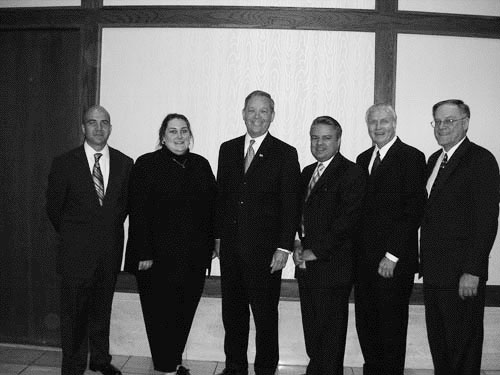Juvenile Court Benchmark Hearings “A local strategy for a national problem”
Thousands of children across the country have been found to be abused or neglected and are placed in foster care on a yearly basis. Large numbers of these children are returned home safely when the issues that brought their case into the court system are resolved. Many more are not returned home, but are adopted by loving and caring foster families. Nationally, still more remain in the system well past puberty and must work to achieve independence through the foster care system. To address the growing needs of teens in the child welfare system in Cook County, there needed to be a local strategy focused specifically on this growing concern. In 2001, Judge Patricia Martin Bishop, supported by Chief Judge Timothy Evans, piloted a program to address the needs of teens growing up in foster care. This program, the first of its kind in the country, is called "Benchmark Hearings."
These special hearings have received attention from the National Council of Juvenile and Family Court Judges as well as that of many jurisdictions throughout the country for their groundbreaking strategy and success in helping teens transition into adulthood. These hearings, currently conducted by Judge Patricia Brown Holmes, allow the youth in care to discuss their goals and understand the actions needed on their part to achieve these goals. Since implementation, these highly successful hearings have involved over 750 youth aged 16 to 21 and have helped them focus on completing various educational and economic endeavors.
Benchmark hearings began as a pilot project involving teens from one residential facility. The hearings were timed to coincide with Illinois Department of Children and Family Services' (DCFS) mandated dates for life skills testing of the teen (no later than 30 days after the 16th birthday and 60 days prior to the youth's planned discharge). Later, the program expanded to include all eligible youth in care aged 16 through 21 whose statutory permanency goal was independence.
These very intense and informal hearings are designed to focus on the needs of the youth. The teen is allowed to express his or her opinions, needs, desires, goals and aspirations to the judge directly. The minor's assistant public guardian/guardian ad litem is present for consultation, if necessary. A representative of the Chicago or local Public Schools is present for each Benchmark Hearing to provide detailed information about the teen's educational history, including enrollment, attendance, academic performance, public service requirements and extracurricular achievements. The school liaison provides information on appropriate programs and services offered by the local school system and how to access these programs.
A caseworker is also present and has the responsibility of bringing the minor to court and preparing supporting documentation for the hearing. The caseworker also helps ensure that the minor has given adequate thought to the issues that will be raised and that the minor brings to court a responsible adult/mentor, if available. This adult/mentor is integral to the continued development and maturity of the minor and provides continuity of authority between hearings. The court is concerned that there is a responsible adult/mentor involved in the life of every child who leaves the court, someone who will maintain contact with the teen and offer support in times of need. Also present are a supervisory assistant state's attorney, a supervisory representative from DCFS, an attorney for DCFS, and other agency personnel.
Part of the court's concern during these Benchmark Hearings is that the child has obtained the actual life skills necessary to prevent homelessness, joblessness, and/or economic failure following case closure. Toward that end, the court seeks information from the minor and caseworker regarding the minor's proficiencies and life skills training including: ability to budget money, vocational and career planning, health care, counseling, housing, financial assistance benefits for youth with special needs, and federal benefits and other public funding. The court is also concerned that the minor has all of the documents necessary to function as an independent adult including: social security card, driver's license or state identification card, library card, voter's registration card, medical records and documentation, birth certificate, list of known relatives with addresses and telephone numbers, educational records, and documents or information on religious background.
At the conclusion of the Benchmark Hearing, the minor and the court agree on various tasks to be performed by the minor prior to the next court date. These tasks are designed to help the minor on the road to independence. The minor participates in setting these goals to ensure they may be achieved. Goals may include obtaining a high school diploma or GED prior to the next court date, enrolling in a college or university, reading various books designed to help the minor focus on making mature and responsible decisions, participating in cultural and educational outings, and writing a "five-year, 10-year or life plan" designed to help the minor focus on the future.
Throughout the nation, teenagers have begun to comprise an increasing percentage of child protection caseloads. These teenagers present unique needs and challenges that are not amenable to cookie-cutter solutions. The Benchmark Hearing program allows the court the flexibility to tailor proceedings to the individual needs of its teenage wards. This perhaps best explains the support that Benchmark Hearings have garnered among state agencies, attorneys, child welfare advocates, and most importantly, the teenagers for whom the program was created.
_______________
Judge Holmes has been an associate judge of the Child Protection Divison of the Juvenile Justice Center in the Circuit Court of Cook County for the past eight years.

Judge Holmes

Above: A photo from The Lawyer's Workshop, sponsored by the Standing Committee on Minority and Women Participation, held in Collinsville on April 15th. From left to right: Andrew P. Fox, Chicago; Jennifer A. Shaw, Edwardsville; Ole B. Pace; Jorge L. Montes, Chicago; Robert Downs; and Dennis Orsey, Granite City.
